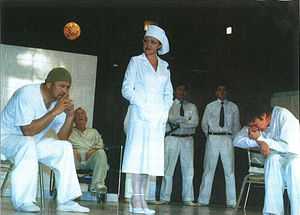Randle McMurphy

Randle Patrick "Mac" McMurphy, known as R.P. McMurphy, is a fictional character and the protagonist of Ken Kesey's 1962 novel One Flew Over the Cuckoo's Nest. He appears in the play and film adaptation of the novel as well. Jack Nicholson portrayed Randle Patrick McMurphy in the film adaption, earning him an Academy Award for Best Actor. He is nominated on the "Heroes" list of AFI's 100 Years... 100 Heroes and Villains, but did not make the final list.[citation needed] He was ranked by Empire as the 61st Greatest Movie Character of All Time.[1]
Richard Gray, author of A History of American Literature, said that McMurphy is an "authentic American rebel", an urban cowboy, plain-speaking, hard-living, a gambler and a risk-taker," and "the hero" of the story.[2] Gray explained that the "[s]waggering" "bold" character has "an incorrigible sense of humor" and "offers the inmates the example of chance and independence."[2] Gray argued that in the novel, McMurphy is "likened to heroes such as Superman."[2]
Glen O. Gabbard, Krin Gabbard, authors of "Psychiatry and the Cinema," said that McMurphy "becomes a Christ figure for whom shock therapy is the crown of thorns and lobotomy the cross."[3]
Fictional character biography
McMurphy is an Irish-American brawler found guilty of battery and gambling (he had also been charged with, but never convicted of, statutory rape, something which he claims was consensual and thus brags about). He is a Korean War veteran who was a POW during the war and was awarded the Distinguished Service Cross for leading a breakout from a Chinese Camp, but was dishonorably discharged for insubordination. He is sentenced to a fairly short prison term, and decides to have himself declared insane in order to be transferred to a mental institution, where he expects to serve the rest of his time in (comparative) comfort and luxury.
McMurphy's ward in the mental institution is run by the tyrannical Nurse Ratched, who has cowed the patients - most of whom are there by choice - into dejected submission. The two hate each other on sight, and McMurphy goes on a crusade to flout Ratched's regime of rules and punishment, as well as liberate the other patients from her grip.
Gray said that when McMurphy organized the yachting trip, it was McMurphy's "greatest triumph."[2]
Throughout his short stay at the hospital, McMurphy forms deep friendships with two of his fellow patients: Billy Bibbit, a stuttering manchild whom Ratched has dominated into a suicidal mess; and Chief Bromden, a Native American who appears to be catatonic. In the former, McMurphy sees a younger brother figure whom he wants to teach to have fun, while the latter is his only real confidant.
McMurphy becomes ensnared in a number of power-games with Nurse Ratched for the hearts and minds of the inmates. Toward the end of the novel, however, McMurphy is the clear winner, reminding the other patients how to enjoy life and stand up for themselves, and persuading them to act out against Ratched's bullying. Ratched tries everything to break his spirit through repeated shock therapy treatments, but he emerges from every punishment more defiant than before.
In the novel's climax, McMurphy sneaks two prostitutes into the ward to take Billy's virginity, while he and the others throw a party. Ratched catches them and threatens to tell Billy's mother - the only woman he fears more than her - which terrifies him so much that he commits suicide by slitting his throat. Enraged, McMurphy attacks and nearly strangles Ratched to death, but he is knocked away and unconscious by one of her associates before he can. For this, Ratched has McMurphy lobotomized. Chief Bromden, unable to stand seeing his friend as a mindless zombie nor used as a symbol by Ratched to remind others of what happens when one "bucks the system", smothers him to death with a pillow in an act of euthanasia. Bromden then uses a marble hydrotherapy control panel as a battering ram to break the window and flee from the asylum.
In other media

McMurphy has been played on stage by Jérôme Pradon, Kirk Douglas, Leonard Nimoy, Aleksandr Abdulov, Gary Sinise, Christian Slater, Shane Ritchie, Roman Wilhelmi, (Polish adaptation),Salman Khan, Bernard Tapie (French adaptation), Ibrahim Amr, (Egyptian adaptation), Jiří Hrdina, (Czech adaptation), and most recently by Uri Meir. He was most famously portrayed by Jack Nicholson in the 1975 film adaptation for which Nicholson won the Academy Award for Best Actor.
R.P. McMurphy is also the subject of a song of the same name by the Manic Street Preachers. This appears on the "Stay Beautiful" single and also on the bonus disc of the 2009 Japanese Remaster of Generation Terrorists.
In the video game Silent Hill: Downpour, the main character's name, Murphy Pendleton, is a homage to McMurphy and his former place of work, Pendleton Farm.
McMurphy is also referenced in the Pulitzer Prize-winning musical Next to Normal in the song "Didn't I See This Movie?"
In addition to this, McMurphy is referenced in television program, Freaks and Geeks, in episode 7, where 3 of the main characters go to get fake identification cards. The man selling them refers to Daniel (James Franco) as McMurphy due to the striking resemblance in attire.
In the video game Grand Theft Auto V, Trevor Philips - one of the game's three protagonists - appears to be loosely based on McMurphy.
References
- Gabbard, Glen O. and Krin Gabbard. Psychiatry and the Cinema. American Psychiatric Pub, 1999. ISBN 0880489642, 9780880489645.
- Gray, Richard. A History of American Literature. John Wiley & Sons, September 23, 2011. ISBN 1444345680, 9781444345681.
- Ken Kesey, One Flew Over the Cuckoo's Nest, Viking Press, 1962
Notes
| ||||||||||||||